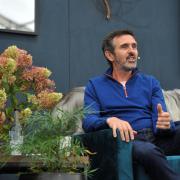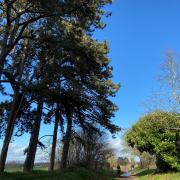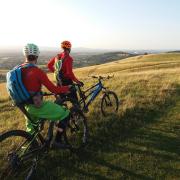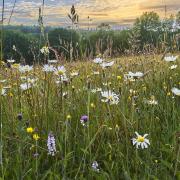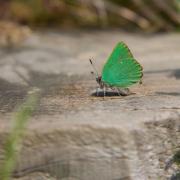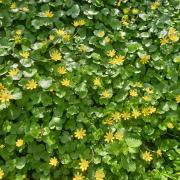In this extract from his recently-published book, Rory Knight Bruce regales us with tales of hunting with the Beaufort, the Berkeley and the Weston Farmers
'Hounds will follow you for two reasons. Because they are told to or because they just might think something exciting will happen.' - Ian Farquhar
When, by way of introduction, I mentioned that I had been conceived at the kennels, a great cry went up from the audience: "So were most of us." - Rory Knight Bruce
One of my great but vanished teenage friendships from Stowe was with Charlie Part whose father's family owned the General Trading Company and whose mother had remarried a Gloucestershire landowner called Pat Shuter. When they asked me to stay with them at Crudwell my father refused to take me, reasoning that I saw quite enough of him in term time, so they came and picked me up themselves.
To go from the high banked Devon lanes to the stone walls and open fields of Gloucestershire was a revelation. Not only that, Part had friends who had parents who gave them teenage parties, something quite new to me. He also had a den at the top of the house where we plotted unsuccessfully the overthrow of damsels, usually accompanied by Grateful Dead records and titanic quantities of marijuana.
One autumn, as I was stacking bales, the Beaufort foxhounds came by after cub hunting. It was an altogether more powerful spectacle than the hunting of my childhood, more hounds and people and an obvious standard of smartness with hunt staff in green livery. From that moment I nurtured an ambition to hunt with them one day.
Later I was taken to Highgrove and met Harold Macmillan, whose son Maurice then owned it. I sat and talked to Harold Macmillan over a glass of whisky, a memorable meeting for a 15-year old. The Shuters also took me to Badminton Horse Trials, where they looked after a fence. The Queen walked the course and talked to them, surrounded by her Labradors.
Something of these experiences must have come back to me many years later when I wrote to Ian Farquhar and asked if I could come and write about the Beaufort. It is a measure of him as a man of trust that he and Pammy Jane asked me to bring my horse and stay for a week's cub-hunting.
What I experienced was the very best elements of hunting at the highest level and no one should attempt to embark on a mastership without first looking at the rhythm and workings of a four-day-a-week pack where one day moves into another like the cogs on a leviathan. Every department demands the best men available, an acute but natural sense of both leadership and diplomacy, and a tireless love of foxhunting. This was the atmosphere that Ian Farquhar had created about him, together with a pack of hounds renowned for their speed and ability where not to be able to gallop and jump behind them is to fail.
When I look back on that week now, I realise that even I was ill-prepared for the stamina required. We would get up at six o'clock, which is no hardship unless you have been up playing chess with your host until barely an hour before. Hunting would be to lunchtime and we would then go to see a farmer on whose land we had been and share the stories of the morning with him over a bottle of whisky.
I would then drive us home and was more than grateful that Ian would take the opportunity to have 'forty winks' as I puzzled out the way. He had an uncanny knack of waking up just as I pulled into the yard. In the afternoons, I would go and see either stud groom Brian Higham (who has an inexhaustible supply of unprintable jokes) or kennel huntsman Charles Wheeler at the kennels. Having been caught napping in a lay-by near the Hawkesbury Monument I took even more drastic action. Thereafter, I would have my siesta undisturbed between two alabaster effigies - a knight and his dame-in Tetbury church, near the tombstone of Whyte-Melville himself.
One early morning, the Farquhars' new groom failed to turn up and Ian told me to tack up three horses, something I had never done before. Mrs Farquhar came to the rescue in her dressing gown. As I was leaving, I asked Ian if, like me, he had never tacked up a horse, to which he replied: 'When you tack up a horse, you put a groom out of work.' I have always kept that advice.
But what I learned from Ian Farquhar was the spirit in which hunting should be conducted. 'Hounds will follow you for two reasons,' he said to me one day. 'Because they are told to or because they just might think something exciting will happen.'
I have never heard him on the hunting field call a hound by name or tell them when they are going to leave the meet or where they will be hunting next. Like humans, hounds respond to being involved in the uncertainties and interest of the day.
That successive Dukes of Beaufort have maintained their ancient involvement with their hunt is one of the wonders of both Gloucestershire and hunting. Whole headlands are left to cope with the number of mounted followers who, in turn, add to the prosperity of this community. Always there is Martin Scott, helpfully letting anyone who wishes to know, and many do, about the hounds and their breeding.
Over the years, I have been allowed back to the Beaufort on several occasions, from Opening Meets with more than 280 riders to hill days in the spring near Bath racecourse with less than 40. I look at Worcester Lodge as the gateway to hunting in the West Country, where the standards and generosity of the hunt, and the welcome foot followers get from their counterparts, are second to none.
Nor should it be thought that Ian Farquhar, surrounded as he is by a willing and experienced team, misses anything by way of preparation or analysis. With him after hunting one night, I was caught short and left the farm kitchen where we were to find my way outside from the pantry barred by a rottweiler on a chain. Availing myself of the nearby sink, the door was flung open and there was the silhouette of the master, like the Sandeman statue, with the words: 'What are you doing?'
One day out hunting, we stopped briefly in a lane and someone told me that is where the Shuters now lived. Sadly they were not in for me to thank them for retrieving me from my Devon fastness which was the beginning of many journeys to Gloucestershire.
***********************
The neighbouring Berkeley have a history every bit as long as the Beaufort but the advent of the M5 motorway in mid 1970s curtailed their activities to two days a week. Once their country, with hunt staff in their mustard or broom livery (reflecting the family's ancient Plantagenet origins), stretched from Berkeley Castle to Berkeley Square.
In what was one of the cleverest pieces of journalism, the great country house writer Hugh Massingberd, when interviewing Major John Berkeley (master 1960-84) managed to explained the meaning of the well known swear word 'Berk'. It originated with the London carriage drivers. Today, few people would be called a 'right Berkeley hunt' but its phonetic rhyming cousin is known to us all.
My initial visits to the Berkeley were thanks to Detmar Blow and his wife Isabella whose family own the Hilles estate near Painswick. They would always host a meet during Cheltenham week. Detmar Blow, whose cousin Simon wrote the Leicestershire hunting book Fields Elysian, would hunt on a polo pony with great style. We once went to an Opening Meet together and, following hounds in a good hunt, jumped the Open cross-country course backwards. Big blackthorn hedges and rhines, wide drainage ditches filled with water, typify this country. Both are made more jumpable by following the lead of field master Helen Hillard. Her children, Polly and Charlie Gundry, have also made significant careers in racing and hunting.
The kennels with their distinctive lemon hounds lie just beyond the walls of the 12th century castle where Edward II was murdered by having a red hot poker rammed up his 'orifice' for his love affair with Piers Gaveston. I once turned up there on a cold winter's day and huntsman Chris Maiden's father Bert was mowing the grass yard. When I asked Chris why, he replied: 'It's my revenge. He always made me do it when I was growing up.'
A cold grey sky straked with clouds always seems to typify my winter visits to the Berkeley. There is a darkness to the soil and a large following from the farming community which live here on the reaches of the river Severn. I have stayed in the village at the Berkeley Arms, and gone on a Sunday to the Salutation Inn, and all the conversation is about the hunt.
When I finally moved into my father's bedroom at home some years after his death, I found two Lionel Edwards' watercolours of days out with the Berkeley, and I look at them each morning. One year, I was invited to give the talk at the annual earthstoppers' dinner to 150 farmers and farm workers. When, by way of introduction, I mentioned that I had been conceived at the kennels, a great cry went up from the audience: "So were most of us."
*****************
I was cub-hunting with the Beaufort when Hugh Dalgety first told me to visit the 'little secret' of the Mendip Farmers', also in this part of the world, and I have since had several days with them from Priddy Green, above the Cheddar Gorge. This country is full of small stone walls which give it a feeling of Ireland.
The meet to which I could always return is from the Hunters' Lodge near Priddy owned by the Dors family. The film star Diana Dors, a relative, changed her name to theirs when her agent said she would never get on with her natural surname of Fluck.
These hounds were once hunted by my late father's best man Peter Long. From high on the Mendips it is possible to see the Bristol Channel, but little has changed here, not 12 miles from the city, and there is still a dairy herd on the farm on the green and, at the New Inn at Priddy, the modest menu coyly announces a pudding of 'Spotted Richard.'
One visit was with Marek Kwiatkowsi and, having jumped some rails, I saw first his top hat, then him and then his horse come over a hedge. The horse had been leant to him by the trainer Kim Bailey which he insisted on calling 'Bert'. It was in fact Docklands Express. 'I've crushed Lord Scarsdale's topper,' he said, picking himself up. To ease the pain of what turned out to be broken ribs, he insisted we stop at every pub on the way back to his home in Marlborough.
******************
Below the Mendip Farmers' on the Somerset Levels are the redoubtable Weston and Banwell Harriers who, like the Berkeley, prefer their ditches with plenty of water in them. It is not uncommon for a tractor to be on hand to pull out both unfortunate horses and riders.
The kennels can be seen from the M5 under the shadow of Crook's Hill and Webbington Court, now a hotel but once the home of the Tiarks banking family who have been great supporters of the hunt. The present mastership of George and Lizzie Milton is one of the most cheerful in the sport. 'Always Look On The Bright Side of Life,' George Milton will sing as another member of his field takes a ducking.
For some reason I declined George's offer of a horse and took Penelope, my own horse, for my day with him. Having come from the Middleton she had never seen a rhine before, and I doubt if she would like to see one again. 'We haven't really had any visitors in years,' George Milton told me. As it is impossible to get round without jumping the rhines, I can see why.
But the Weston and Banwell have a great following and the motorway traffic just passes them by. It would, however, be wise for any visitor to hire a horse from within the country which is used to these watery obstacles. Penelope, who tried her hardest, jumped several of them in the end but not before we had fallen over backwards in one, emerging covered in algae.
How often do we all drive through a hunting country and wonder what it would be like to hunt there? I never pass by the kennels now without pointing them out to anyone who is with me and, indicating the largest rhine, where Penelope and I met our match.
Sometimes I am asked if I am ever frightened out hunting, particularly riding different horses in unknown countries. The truthful answer is I am always nervous before hunting, not wishing to be late and wanting to have my own thoughts before getting on a strange horse, since it is my intention to be 'in on the day' and I have never written a hunting report without being on horseback. I also hold by the old adage that a huntsman whose hand does not shake before the meet will never catch a fox.
Two incidents, one of fear and one of certain death, do occur to me and both, as it happens, took place with the Beaufort. One of the great luxuries of hunting with the Beaufort is the necessity in a day for two horses. Nothing in hunting is more dispiriting than to have to pull up because of a tired horse.
The change on to second horses varies in time and can either be quick or there is a stop for a drink. It is always as well to be prepared for the former, since the decision is out of anyone but the huntsman's hands.
Having hired two horses and come to the change, the male groom was slow with my second horse and I found myself alone, with only a notion where to catch up with the hounds and riders. I was on the south side of the M4 motorway and the hounds had hacked over it. As always I had asked if there was anything I should know about the horse to which the groom had replied: 'A youngster just over from Ireland'.
Coming to the M4, I found a small narrow footbridge guarded only by a low rail and imagined this is where the mounted field had crossed. I was later to find out they had in fact crossed by a road bridge three hundred yards further up.
As I walked the horse across the bridge, cars and vans started hooting at me in a combination of support and disapproval of hunting. I saw them briefly 30 feet below, the sound of their passing at speed under the bridge - and the horse - like motocycles at a speedway.
I could not turn back as the footbridge was too narrow. It was the longest journey of perhaps two minutes where at any moment the horse could have jumped, spooked, into the abyss below. But it is a measure of the maturity of young Irish horses that I was carried safely across. I do not mind admitting, however, that when I got to the other side I got off that horse and flung my arms around him in gratitude.
The first person I saw was Bobby Faber, resplendent in his Blue and Buff, listening to hounds as they found in Faggots. 'Wonderful to be alive,' he said, greeting me. If I was unusually chatty to him at that chance meeting, perhaps now he will know the reason why.
The second occasion was also with the Beaufort when, last season, they took their hounds to Cornwall for a day with both the East Cornwall and Four Burrow. No-one who went on those days, either as visitors or hosts, will forget the sport and hospitality we enjoyed.
I will not forget a sheet metal bridge in the East Cornwall country that I encountered in the afternoon. Having got on good terms with the hounds I found myself alone with them on the moor, with a strong scent and fading sunshine. Before me was a bridge over a river wired on both sides which the hounds had got through. At full gallop I aimed Penelope for the bridge only to find, at an unstoppable moment, two men on a quad bike rolling out some matting on it.
'Get out of the way,' I screamed at them, just as my horse's hooves hit the ice rink of the bridge's metal surface. I did this, not as an example of how people once addressed foot followers, but to save their lives as it was certain I was going to die and not at all unlikely that they would be joining me.
The men scattered and Penelope flailed, for who would expect to find a metal floored bridge in the middle of a moor? By her own instinct - and how often is instinct greater than knowledge?- she managed to jump the quad bike with me on board and land on the rubber matting on the other side. I did not fall off but jumped off to make sure the sudden jolt had not jarred her legs, made a quick apology to the men, hopped back on and was still ahead of the field. 'E treats uz a bit ol'fashioned,' one of the men was heard to say later, but it really was a case of 'needs must'.
Sometimes I am also asked if I believe in God, to which I always reply: 'In my job, wouldn't you?' When I occasionally jump a big place, I have a strange sensation afterwards. It is as if my father was still alive, standing there, saying something kind to me.



